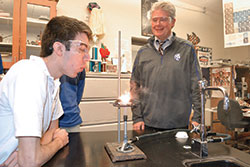2017 Catholic Schools Week Supplement
Teacher finds the right chemistry at Catholic high school

Bishop Chatard High School chemistry teacher Dan McNally smiles at Daniel Burger’s reaction to an experiment. (Submitted photo)
By John Shaughnessy
After teaching for six years in a public school, Dan McNally experienced a refreshing change on his first parents’ night at Bishop Chatard High School in Indianapolis.
“The mother of a chemistry student who was having some difficulty in my class pulled me aside and said, ‘The last chemistry teacher always gave the kids the easy way out. We’re so glad you’re here,’ ” McNally recalls. “It seemed as though providing a challenging curriculum was desired instead of criticized, as was common at my past schools.
“Soon, it was clear that Bishop Chatard provided an environment for both teachers and students where the primary desire was to support one another. Parents were always going to support their kids, but they were also going to support the teacher. It is as though parents have faith that teachers have the best interest of the student in mind, and are confident that we can all pull together to ensure the best outcome.”
Now, after 32 years of teaching at Bishop Chatard, McNally has developed a deeper appreciation of the gift the Catholic school provides.
“One finds that there is a genuine effort on the part of all interested parties to see the face of God in each other,” says McNally, a finalist for the 2016 Saint Theodora Guérin Excellence in Education Award, the highest honor for an educator in the archdiocese. “A simple outlook, but one with profound results—the personification that Jesus brought to Earth doesn’t have to be limited to Jesus himself.”
McNally has also tried to keep that perspective in 60 seasons of coaching boys’ and girls’ tennis at the archdiocesan Indianapolis North Deanery high school. He shares the story of one young man—“let’s call him Evan”—a former public high school student who wanted to join the team seemingly because it “might give him a head start at becoming familiar and comfortable in a new setting.”
“Evan was not particularly skilled on the tennis court, and he didn’t show the athleticism that would predict much improvement. As it turned out, there was exactly the number of guys trying out that we needed, so we kept him on the team.
“Four years later, we had a young man who had obliterated the school record for most career losses. Sure, he got better as he grew up and got stronger. He even got to play a varsity match against a weaker opponent and won!”
Years later, Evan still comes by Bishop Chatard to reconnect with McNally—a reality that leads his former coach to share a reminder with all coaches and teachers.
“As teachers and coaches, we need to remind ourselves every single day of the immense influence we are privileged to exert on our students and athletes. They process every word and every action. It might be just another class or just another practice to us. But it just might be the most important class or practice of their life. The care we take in the preparation and execution of a lesson plan or practice plan can never be discounted.
“If we can do those things while looking for the face of God in each kid, we are bound to be successful educators.” †
